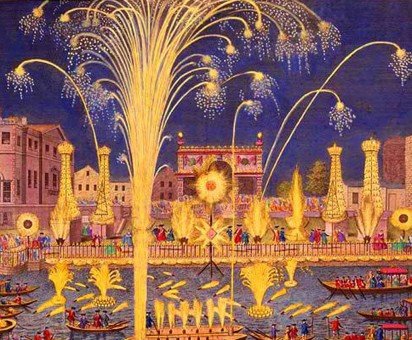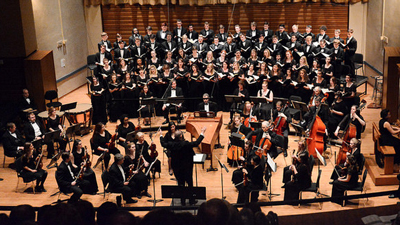By Daniel Hathaway
. BW Bach Festival heads a long list of weekend performances
. Almanac: A Handel disaster, a Margaret Brouwer environmental cantata premiere, Shakespeare + Vaughan Williams, a perfect marriage of words and music
HAPPENING THIS WEEKEND:
Multiple performances include the 91st Baldwin Wallace Bach Festival, which begins on Friday evening when the Boston-based Baroque string band ACRONYM plays an all-Bach concert featuring two of J. S. Bach’s six Brandenburg Concertos, along with one of his cantatas, and more. The special guest is Catharina Meints, viola da gamba.
Guest conductor Bernard Labadie continues a four-concert run with The Cleveland Orchestra featuring soprano Lucy Crowe on Friday evening (through a Sunday matinee), Les Délices salutes Renaissance patron Isabella D’Este in Akron Friday evening, program repeated Saturday evening in Lakewood and Sunday afternoon in Shaker Hts.
The Cleveland Philharmonic presents competition winner Marina Ziegler (violin, in the Sibelius concerto) on Friday evening at CSU and Sunday afternoon in Westlake, Jay White leads Quire Cleveland in multiple settings of the Lord’s Prayer on Friday evening in downtown Cleveland, repeated Saturday evening in Chesterland and Sunday afternoon in Rocky River, and Cleveland Ballet premieres Anna Segal’s new score Symphony of Life on Friday evening in Playhouse Square, repeated Saturday evening.
Single performances fill in the rest of a busy weekend calendar.
On Friday evening, CityMusic Cleveland remembers WW II Era Jewish composers in a concert at Praxis Fiber Gallery, violinist Jinjoo Cho plays at the Wayne Center in Wooster, Peter Phillips conducts The Tallis Scholars in a 50th Anniversary Tour stop at the Cleveland Museum of Art, and pianist Angelin Chang headlines “Firefish Festival” with video by Kevin Jackson in Lorain.
On Saturday, the BW Bach Festival continues with daytime presentations and an evening concert by BWV: Cleveland’s Bach Choir and ACRONYM, Cleveland Classical Guitar Society presents Scottish virtuoso David Russell in Shaker Heights, and Carl Topilow leads the Firelands Symphony and Chorus with Junior Sphinx Competition winner Ifetayo Ali-Landing in Huron.
On Sunday, the BW Bach Festival concludes with the b-minor Mass, Akron’s Urban Troubadour hosts The Oblivion Project in Cuyahoga Falls, Susan Davenny Wyner conducts the Warren Philharmonic, Michael Carney leads the vocal ensemble Good Company in “Lost in the Stars” in Lakewood, organist Karel Paukert remembers in a concert in Cleveland Hts. the legacy of Clevelanders who were prominent in the recording industry or recipients of Grammy Awards, and Music from the Western Reserve hosts a Baldwin Wallace University Musical Theater Showcase in Hudson.
Details (ticketing, times, and addresses) are only a click away on our Concert Listings page.
WEEKEND ALMANAC:
by Daniel Hathaway

And in 1899, composer Randall Thompson was born in New York City. Best known for his choral music, although he also wrote symphonies and an opera, his Alleluia has been sung around the world. Serge Koussevitzky commissioned it for the 1940 opening ceremony of the Berkshire Music Center at Tanglewood, requesting a piece with simple words that could be learned and sung by international musicians in a single, short rehearsal. While writing it, the composer learned of one of the pivotal moments in World War II, and described his piece as “a sad fanfare for the fall of France.” Click here for a decidedly international performance by Stockholm’s St Jacobs Chamber Choir at the Basilica di San Pietro in Perugia, Italy.
April 22 is Earth Day. In honor of this year’s theme, “Invest in Our Planet,” take time to watch Act IV of Margaret Brouwer’s environmental cantata Voice of the Lake, with Domenico Boyagian leading Brouwer’s Blue Streak Ensemble and Chamber Singers, soloists Angela Mortellaro, soprano, Sarah Beaty, mezzo-soprano, Brian Skoog, tenor, and Bryant Bush, bass, and the CIM Children’s Choir in Kulas Hall at the Cleveland Institute of Music on October 19, 2018.
“Sunrise at the Lake. The tenor is walking on the beach. Everything is beautiful until he comes to the algae. At first he ignores it, but finally must come to terms with his feelings of revulsion for it. He hurries back to the good area of the beach where he finds the children and the others. They sing about how beautiful it is this morning, and their hope that the lake will remain this way. They resolve to clean up the lake.”
According to some sources, “The Bard of Avon,” William Shakespeare, was born on April 23, 1564, and it’s a fact that he died on the same date in 1616. Setting aside the contentious question of whether or not the son of a glove maker from Stratford-Upon-Avon actually authored the plays and poems attributed to him, we’ll honor both his arrival and departure dates with a setting of words from The Merchant of Venice, Act 5, Scene 1. By moonlight, Lorenzo and Jessica are discussing music both earthly and celestial, and Lorenzo comes to the conclusion that
The man that hath no music in himself,
Nor is not mov’d with concord of sweet sounds,
Is fit for treasons, stratagems and spoils;
The motions of his spirit are dull as night
And his affections dark as Erebus:
Let no such man be trusted.
Ralph Vaughan Williams wrote A Serenade to Music to mark the 50th anniversary of the first concert conducted by Sir Henry Wood, who led the popular “Proms” (Promenade Concerts) for 50 years. The original work featured sixteen soloists chosen by the conductor and the composer, who at times sing as a choir. Members of the London Symphony, the BBC Symphony, and the London Philharmonic joined together for the first performance at the Royal Albert Hall on October 5, 1938 (listen to the first recording here.)
Here, in one album, are three versions of the piece from Vaughan Williams’ pen: for soloists (with the London Philharmonic conducted by Sir Adrian Boult), for chorus and orchestra (with the Royal Philharmonic Choir and Orchestra, led by Vernon Handley), and for orchestra alone (with the Northern Sinfonia under Richard Hickox).




